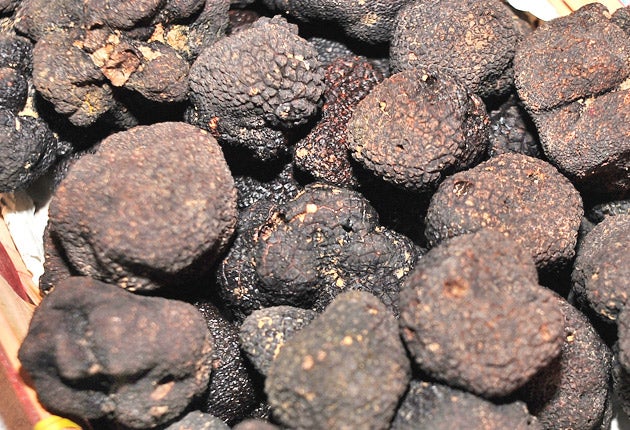Truffles – the luxury France is dying for

The spiralling price of seasonal delicacies has generated a "luxury" crime wave in France this Christmas – and now one violent death.
An ill-tempered war in the South of France over the theft of truffles has claimed its first victim. A young truffle-producer in the Rhône valley has been arrested on possible murder charges after shooting dead a man whom he suspected of raiding his "truffle groves" in the middle of the night.
At the same time, oyster beds on the French Atlantic coast are being protected by infrared cameras, helicopters and mounted policemen as a steep rise in prices has brought a surge in thefts. Professional oyster rustlers can steal up to three tons in a single night.
Near the village of Grignan in Drôme, in the Rhône valley, Laurent Rambaud, 32, a local farm union official, and truffle producer, shot an intruder in the leg and in the head on Monday night. More than 200 local people marched in the rain the following day to support Mr Rambaud and call for his release.
Thefts of truffles have become increasingly common in recent years as shortages have driven the wholesale prices of the much-prized underground mushrooms to between €800 (£680) and €1,000 a kilo.
Wild truffles have almost disappeared in France. Almost all the harvest of the black French truffle, or tuber melanosporum, comes from plantations cultivated by farmers and wine producers.
The shortage, and high price, of truffles has generated a wave of truffle-related crime: raids on truffle plantations; the armed theft of cash from truffle traders; the theft of "truffle trees"; and even the rustling of champion truffle-sniffing dogs.
The victim in the shooting at Grignan has been identified as a 43-year-old man from the next commune, Saint-Paul-Trois-Châteaux, who had previous convictions for theft. Mr Rambaud told investigators that he stumbled on the man in the dark, thought that he was armed and shot him in self-defence. The victim was carrying only a truffle-digging trowel.
Mr Rambaud, who faces possible charges of murder, is part of a well-known local farming family. He is president of the local branch of the Jeunes Agriculteurs ("young farmers") and a volunteer fireman.
Jean-Charles Savignac, president of the French federation of truffle producers, told The Independent yesterday: "This is the first time that anyone has been killed but there have been scores of other incidents when there have been scuffles or shots fired in the air. Maybe now, the authorities will start to take this problem more seriously."
Legitimate producers use dogs to sniff out the mature truffles, he said. Raiders tend to dig up a whole plantation, ruining the ground for years to come.
"That explains why there is such anger out there," Mr Savignac said. "Police and magistrates still seem to think that truffles are wild, like mushrooms, and that truffle-stealing is relatively harmless. They don't understand the heartache that truffle-stealing causes." Some truffle producers claim that one in three of all the truffles sold in France is stolen.
Oyster prices are also spiralling in France this winter. A herpes virus known as OsHV-1 has been killing off baby oysters, or spats, around the French coastline for three years, causing a shortage of mature oysters this Christmas. Production is down between 40 and 50 per cent. Shop prices are up by 15 to 30 per cent.
As a result, oysters are a tempting target for thieves. Oyster producers, already threatened with ruin, are economically vulnerable to thefts. And some unscrupulous producers are suspected of helping themselves to their neighbours' shellfish.
Last year, 18 tons of oysters were surreptitiously harvested from the Bassin d'Arcachon, on the Bay of Biscay coast. This year so far, only 3.3 tons have officially been declared stolen, but oyster producers say that the real figure is much higher.
Jérôme Delarue, who farms oysters in the Bassin d'Arcachon, says the culprits are other local producers. "We all know who does it, and they're free to start doing it again," he said. "What we need is big examples. We all know who the culprits are, but we're all neighbours. We just have to smile at each other and say nothing."
Subscribe to Independent Premium to bookmark this article
Want to bookmark your favourite articles and stories to read or reference later? Start your Independent Premium subscription today.

Join our commenting forum
Join thought-provoking conversations, follow other Independent readers and see their replies